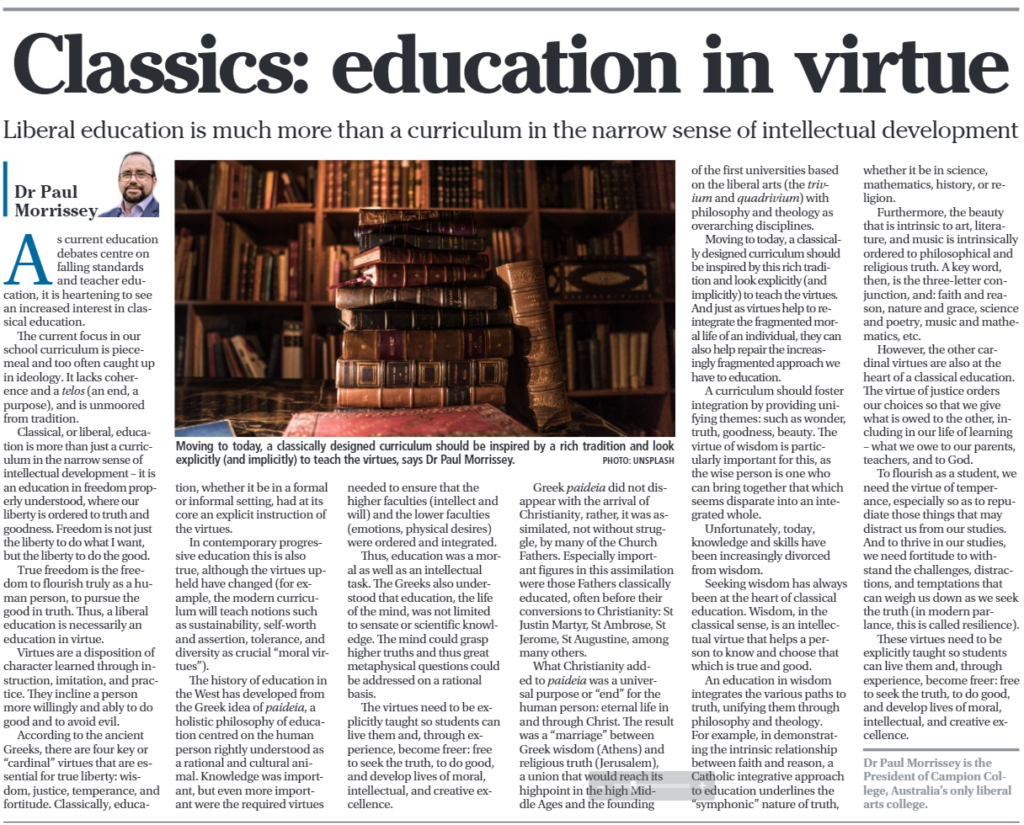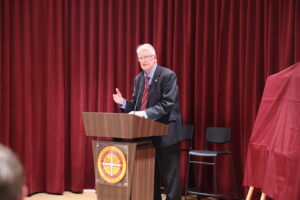The place of the virtues in Classical Education


Dr Paul Morrissey
Campion College President
As current education debates centre on falling standards and teacher education, it is heartening to see an increased interest in classical education.
The current focus in our school curriculum is piecemeal and too often caught up in ideology. It lacks coherence and a telos (an end, a purpose), and is unmoored from tradition.
Classical, or liberal, education is more than just a curriculum in the narrow sense of intellectual development – it is an education in freedom properly understood, where our liberty is ordered to truth and goodness. Freedom is not just the liberty to do what I want, but the liberty to do the good.
True freedom is the freedom to flourish truly as a human person, to pursue the good in truth. Thus, a liberal education is necessarily an education in virtue.
Virtues are a disposition of character learned through instruction, imitation, and practice. They incline a person more willingly and ably to do good and to avoid evil.
According to the ancient Greeks, there are four key or “cardinal” virtues that are essential for true liberty: wisdom, justice, temperance, and fortitude. Classically, education, whether it be in a formal or informal setting, had at its core an explicit instruction of the virtues.
In contemporary progressive education this is also true, although the virtues upheld have changed (for example, the modern curriculum will teach notions such as sustainability, self-worth and assertion, tolerance, and diversity as crucial “moral virtues”).
The history of education in the West has developed from the Greek idea of paideia, a holistic philosophy of education centred on the human person rightly understood as a rational and cultural animal. Knowledge was important, but even more important were the required virtues needed to ensure that the higher faculties (intellect and will) and the lower faculties (emotions, physical desires) were ordered and integrated.
Thus, education was a moral as well as an intellectual task. The Greeks also understood that education, the life of the mind, was not limited to sensate or scientific knowledge. The mind could grasp higher truths and thus great metaphysical questions could be addressed on a rational basis.
The virtues need to be explicitly taught so students can live them and, through experience, become freer: free to seek the truth, to do good, and develop lives of moral, intellectual, and creative excellence.
Greek paideia did not disappear with the arrival of Christianity, rather, it was assimilated, not without struggle, by many of the Church Fathers. Especially important figures in this assimilation were those Fathers classically educated, often before their conversions to Christianity: St Justin Martyr, St Ambrose, St Jerome, St Augustine, among many others.
What Christianity added to paideia was a universal purpose or “end” for the human person: eternal life in and through Christ. The result was a “marriage” between Greek wisdom (Athens) and religious truth (Jerusalem), a union that would reach its highpoint in the high Middle Ages and the founding of the first universities based on the liberal arts (the trivium and quadrivium) with philosophy and theology as overarching disciplines.
Moving to today, a classically designed curriculum should be inspired by this rich tradition and look explicitly (and implicitly) to teach the virtues. And just as virtues help to reintegrate the fragmented moral life of an individual, they can also help repair the increasingly fragmented approach we have to education.
A curriculum should foster integration by providing unifying themes: such as wonder, truth, goodness, beauty. The virtue of wisdom is particularly important for this, as the wise person is one who can bring together that which seems disparate into an integrated whole.
Unfortunately, today, knowledge and skills have been increasingly divorced from wisdom.
Seeking wisdom has always been at the heart of classical education. Wisdom, in the classical sense, is an intellectual virtue that helps a person to know and choose that which is true and good.
An education in wisdom integrates the various paths to truth, unifying them through philosophy and theology. For example, in demonstrating the intrinsic relationship between faith and reason, a Catholic integrative approach to education underlines the “symphonic” nature of truth, whether it be in science, mathematics, history, or religion.
Furthermore, the beauty that is intrinsic to art, literature, and music is intrinsically ordered to philosophical and religious truth. A key word, then, is the three-letter conjunction, and: faith and reason, nature and grace, science and poetry, music and mathematics, etc.
However, the other cardinal virtues are also at the heart of a classical education. The virtue of justice orders our choices so that we give what is owed to the other, including in our life of learning – what we owe to our parents, teachers, and to God.
To flourish as a student, we need the virtue of temperance, especially so as to repudiate those things that may distract us from our studies. And to thrive in our studies, we need fortitude to withstand the challenges, distractions, and temptations that can weigh us down as we seek the truth (in modern parlance, this is called resilience).
These virtues need to be explicitly taught so students can live them and, through experience, become freer: free to seek the truth, to do good, and develop lives of moral, intellectual, and creative excellence.
This article appeared in The Catholic Weekly on 13 November and in News Weekly on October 26, derived from a talk given at a conference in late September.




